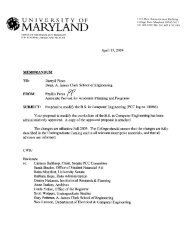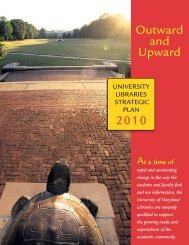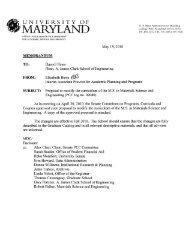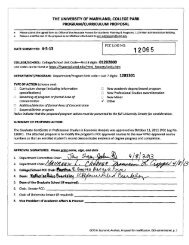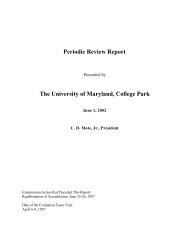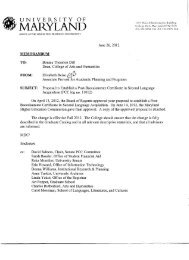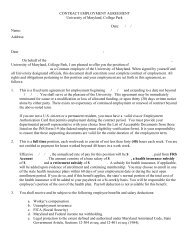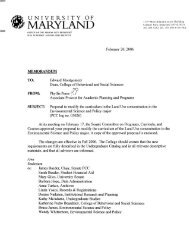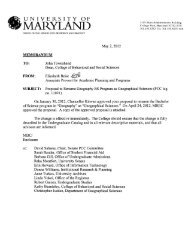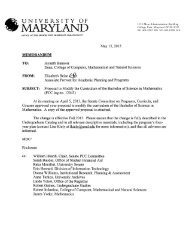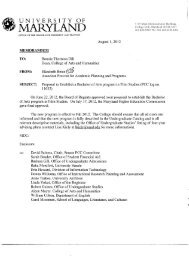Elements of a Dossier - University of Maryland - Office of the Provost
Elements of a Dossier - University of Maryland - Office of the Provost
Elements of a Dossier - University of Maryland - Office of the Provost
You also want an ePaper? Increase the reach of your titles
YUMPU automatically turns print PDFs into web optimized ePapers that Google loves.
<strong>Elements</strong> <strong>of</strong> a <strong>Dossier</strong> - <strong>University</strong> <strong>of</strong> <strong>Maryland</strong><br />
candidate is being reviewed (policy reference). Hence, even though a unit’s Plan <strong>of</strong> Organization may allow votes from faculty below<br />
<strong>the</strong> level to which <strong>the</strong> candidate aspires, or from non-tenured faculty members, those votes should not be recorded on <strong>the</strong> Transmittal<br />
Form or any o<strong>the</strong>r part <strong>of</strong> <strong>the</strong> dossier.<br />
Secondary Unit: If a candidate has a permanent joint appointment in a unit with eligible voters, record <strong>the</strong> votes <strong>of</strong> <strong>the</strong> secondary unit and <strong>the</strong><br />
recommendations <strong>of</strong> <strong>the</strong> unit’s administrator. If <strong>the</strong> appointment is in a different college from <strong>the</strong> tenure home, <strong>the</strong> vote <strong>of</strong> <strong>the</strong> College APT<br />
Committee and <strong>the</strong> Dean should also be recorded.<br />
SECTION B: EVALUATIVE STATEMENTS<br />
#2. Dean's Letter: This letter should state <strong>the</strong> Dean’s personal assessment <strong>of</strong> <strong>the</strong> reasons <strong>the</strong> candidate merits or does not merit<br />
promotion (policy reference).<br />
In evaluating <strong>the</strong> candidate, <strong>the</strong> letter should contain an honest and balanced assessment <strong>of</strong> <strong>the</strong> candidate’s scholarship, teaching,<br />
mentoring, and service, and a clearly stated recommendation. If this recommendation differs from that <strong>of</strong> <strong>the</strong> Department APT<br />
Committee, College APT Committee, or <strong>the</strong> Department Chair, <strong>the</strong> reasons underlying <strong>the</strong> dissent should be explained. Please pay<br />
careful attention to negative votes and try to explain <strong>the</strong> reasons for <strong>the</strong>se votes. Additionally, <strong>the</strong> Dean has a unique “local”<br />
perspective <strong>of</strong> importance to campuswide decisions. The Dean can provide a context for evaluating <strong>the</strong> candidate through<br />
characterizing <strong>the</strong> strengths <strong>of</strong> <strong>the</strong> department, its role in <strong>the</strong> college, and <strong>the</strong> role <strong>of</strong> <strong>the</strong> candidate in enhancing <strong>the</strong> excellence <strong>of</strong> <strong>the</strong><br />
department. Because colleges differ in <strong>the</strong>ir mission, <strong>the</strong> letter should also discuss <strong>the</strong> expectations <strong>of</strong> <strong>the</strong> college and department for<br />
promotion. If <strong>the</strong> candidate’s original appointment was based on expectations that differ significantly from commonly accepted<br />
criteria, <strong>the</strong> Dean should discuss <strong>the</strong> source and nature <strong>of</strong> <strong>the</strong> criteria on which <strong>the</strong> candidate is to be evaluated.<br />
#3. College APT Committee Report: This report should include <strong>the</strong> date <strong>of</strong> <strong>the</strong> meeting and <strong>the</strong> names <strong>of</strong> committee members.<br />
The report should include a statement <strong>of</strong> <strong>the</strong> exact vote and <strong>the</strong> reasons for <strong>the</strong> recommendation (policy reference) and it should<br />
address <strong>the</strong> same areas as <strong>the</strong> Department APT report described in #5.<br />
When <strong>the</strong> vote is not unanimous, it is helpful if <strong>the</strong> report discusses <strong>the</strong> reasons for <strong>the</strong> negative votes or <strong>the</strong> abstentions. If <strong>the</strong><br />
assessment differs from <strong>the</strong> department vote, please explain why.<br />
#4. Department Chair's Letter: The letter should contain <strong>the</strong> Chair’s independent evaluation <strong>of</strong> <strong>the</strong> candidate’s teaching, scholarship,<br />
mentoring, and service, and should make a clear recommendation supported by <strong>the</strong> reasons for it (policy references #1 and #2).<br />
As with <strong>the</strong> Dean’s letter, <strong>the</strong> <strong>University</strong> APT Committee finds <strong>the</strong> Chair’s letter to be most useful when it places <strong>the</strong> performance <strong>of</strong><br />
<strong>the</strong> candidate in <strong>the</strong> context <strong>of</strong> <strong>the</strong> department or discipline and comments on <strong>the</strong> APT Committee’s report. Committees also look for<br />
<strong>the</strong> Chair’s interpretation <strong>of</strong> <strong>the</strong> information about <strong>the</strong> candidate, not simply a reiteration <strong>of</strong> information. They seek an honest and<br />
balanced assessment <strong>of</strong> <strong>the</strong> candidate’s scholarship, teaching, mentoring, and service, and a clearly stated recommendation. If this<br />
recommendation differs from that <strong>of</strong> a Department APT Committee, it is helpful to explain <strong>the</strong> reasons . The Chair should also attempt<br />
to explain reasons for negative votes when <strong>the</strong>y are known.<br />
#5a. Department APT Committee Report: (policy reference) The report <strong>of</strong> <strong>the</strong> Departmental APT Committee has two clearly<br />
separable parts. The first part 5(a) describing <strong>the</strong> decision meeting, is ordinarily written by <strong>the</strong> Chair <strong>of</strong> <strong>the</strong> APT Committee or his or<br />
her designee and reports <strong>the</strong> discussions and <strong>the</strong> exact vote as well as any department rules about <strong>the</strong> number <strong>of</strong> votes required for a<br />
positive recommendation. The report should contain <strong>the</strong> meeting date and be signed by its author. The second part 5(b), <strong>the</strong> evaluative<br />
report, is <strong>of</strong>ten written by an initial review subcommittee (whose members should be identified). It summarizes and evaluates <strong>the</strong><br />
candidate’s research, service, mentoring, and teaching contributions in light <strong>of</strong> <strong>the</strong> standards <strong>of</strong> <strong>the</strong> department and <strong>of</strong> <strong>the</strong> discipline.<br />
Nei<strong>the</strong>r report is shown to <strong>the</strong> candidate. These letters along with <strong>the</strong> Department Chair’s letter, are transmitted to <strong>the</strong> higher levels <strong>of</strong><br />
review (policy reference).<br />
It is helpful to consider <strong>the</strong> following questions when preparing <strong>the</strong> evaluative report:<br />
a. What are <strong>the</strong> standards and expectations <strong>of</strong> <strong>the</strong> department or <strong>the</strong> discipline with respect to <strong>the</strong> candidate and how are <strong>the</strong>y<br />
http://www.faculty.umd.edu/policies/<strong>Dossier</strong><strong>Elements</strong>.html (2 <strong>of</strong> 6)8/16/2006 11:41:21 AM



